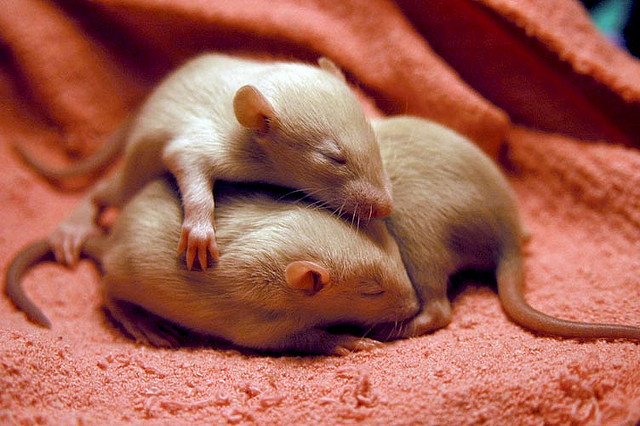Cuddling our children keeps society from collapsing.
An intriguing body of scientific evidence for this comes from long-term research on residents of the low-income district of Hochelaga in Montreal.
The first 2014 issue of Nature, the international weekly journal of science, features an article by Stephen S. Hall, describing the work of University of Montreal scientist Richard Tremblay. In 1984, Tremblay initiated the “Montreal Longitudinal Study,” as it is now known, as part of an effort to deal with hyperactive, physically aggressive kindergarten boys.
Kindergarten teachers identified aggressive behaviour — boys who fought, kicked or bit other children; or bullied or intimidated them. Their parents were interviewed about their own educational attainment, age, socio-economic status and marital status. A subset of the boys showing aggressive behaviour received positive interventions, e.g., they were integrated with better-behaved children to provide positive role models, and their families received support and counselling.
Tremblay, a recent PhD, tracked children from 53 schools in the area, testing the effectiveness of these support measures in dealing with the problem of aggressive behaviour in kindergarten boys. His follow-up studies showed that these boys’ scholastic performance improved and their subsequent aggressive or criminal behaviour decreased. Thirty years and hundreds of scientific publications later, the study is still active.
Tremblay’s research has gone well beyond tracking effectiveness of support measures, to look into the “roots” of aggression. His data indicate that all young children are naturally aggressive: he quotes Saint Augustine as saying: “It is not the infant’s will that is harmless, but the weakness of infant limbs.” Aggressive acts begin when children are very young, peak between the ages of two and four, and normally disappear as they grow older and learn to control their impulses. But in a minority of children — mostly males — anti-social acts persist undiminished in frequency throughout adolescence and into adulthood.
One of Tremblay’s studies presents evidence that “the odds of male offspring of poorly educated teenage mothers not desisting from a high level of physical aggression at age 6 years are 9.3 times greater than those of their counterparts without such mothers.”
A more secure and nurturing environment helps us “unlearn” instinctive aggressive behaviour. But is there also a genetic component to aggression? Tremblay’s more recent work suggests there is, in an interesting way.
The issue may not be whether certain genes are present, but whether genes that trigger aggressive acts continue to be expressed after early childhood. While Tremblay was pursuing his research into human behaviour, geneticists were exploring how genes that are active in young mammals become inactivated as a normal part of development. Chemically speaking, this occurs when a methyl (-CH3) group attaches to certain DNA nucleotides — a process known as DNA methylation.
In 2004 Tremblay met another Montreal scientist, Moshe Szyf at McGill, who had discovered that if mothers of newborn rats lick and groom their babies, the baby rats develop different patterns of DNA methylation than rats who receive less attention from their mothers. In particular, a mother rat’s care alters the activity of genes that determine how her offspring responds to stress.
Tremblay teamed up with McGill researchers to study whether young monkeys show similar changes in DNA methylation in response to maternal care. They compared one group of monkeys nurtured by their mothers with a second group separated from their mothers shortly after birth. Research published in 2012 showed that the two groups of monkeys developed different DNA methylation patterns at a young age and that these changes persisted for the 8-year period of study.
While the genetic changes in the two groups of monkeys were complex, one significant difference involved the functioning of a gene that reduces levels of serotonin, which can lead to elevated stress and aggressive behaviour.
Tremblay, Szyf and others have now published a study that extends these results to humans. They found distinct differences in patterns of DNA methylation in two groups of men from the Montreal Longitudinal Study, one group with a history of aggressive behaviour, the other without.
Tremblay, currently on a 10-year appointment at University College in Dublin, has launched a new longitudinal study of benefits from even earlier intervention. This study will focus on mothers-to-be in a poor neighbourhood of Dublin. They will receive home visits and counselling on nutrition, smoking, drug and alcohol use until their children are four years old. He and his colleagues will compare aggressive behaviour in children of women who receive support measures with children of women who do not. They will also track patterns of DNA methylation in an effort to document whether nurturing by parents can influence gene expression in their children.
Tremblay is aware that findings from the Montreal Longitudinal Study have implications for how we invest public resources. He suggests that one key response is to improve the quality of life for low-income families, who will transfer benefits to the next generation. And his data bear this out: he has also shown that daycare provides significant benefits for children (in terms of reduced aggressive behaviour and improved scholastic outcomes) from low-income families, but not from more affluent families.
Ole Hendrickson is a forest ecologist and current president of the Ottawa River Institute, a non-profit charitable organization based in the Ottawa Valley.
Photo: Kristen Ankiewicz/flickr



